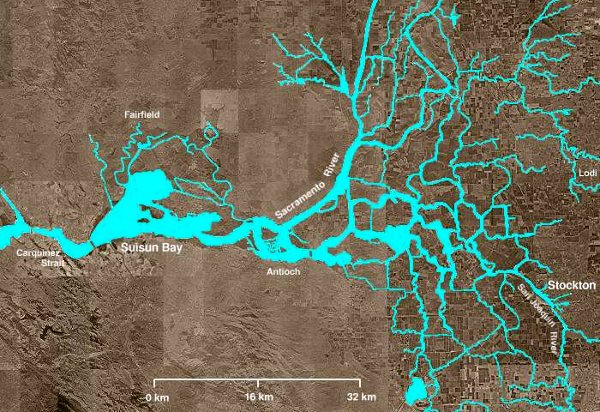Gov. Brown to Announce Contentious Plan for Sacramento Delta


The Sacramento Delta supplies substantial amounts of water to Central Valley agriculture and southern California. It is the most important supply of water for California located inside its borders. Over the decades various plans to send water south instead of allowing it to flow into the Delta have been proposed and rejected. This plan is generally known as the Peripheral Canal and has been called, with good reason, the third rail of California politics (This refers to the electrified third rail which carries the electricity on subways. Step on it and you could die).
California Governor Jerry Brown, for all intents and purposes, just stepped on that third rail and will propose a new version of the Peripheral Canal this week (Brown has uncanny political skills and will no doubt survive this although he might get a bit singed).
The proposed plan will call for construction of massive tunnels from Freeport, CA 60 miles south to Tracy, CA where it will flow into existing canals. Freeport is a few miles south of Sacramento while Tracy is about 25 miles southeast of the Delta. Thus, enormous amounts of water that are currently flowing into the Delta will no longer do so. Instead it will be sent directly south for use by agriculture and the always thirsty Los Angeles / San Diego corridor.
The Delta is already stressed due to lack of water. It supports substantial amounts of commercial and sport fishing as well as agriculture. Some of the most fertile farmland in the country is in the Delta. All of this is already threatened and is difficult to understand how depriving the Delta of even more water will do anything but damage it further. Salmon and smelt populations are already at risk, as is the agriculture.
The state’s response to this so far is not encouraging.
"We decided to embrace scientific uncertainty regarding the facility's operation, water flows, habitat restoration and the response of fish," said Karla Nemeth, program manager for the plan at the California Natural Resources Agency.
Precisely how much water is diverted will depend on what is determined by the scientific studies that will accompany construction, she said.
How can reputable scientific studies be done after construction has started? This is nonsensical. The studies must to be done first, with construction plans following the recommendations.
This behemoth plan will be at least partly financed by a water bond that will be on the 2014 ballot and will take years to complete.
The problem, as always, is that California doesn’t have enough water to meet all needs. Central Valley farmers rightfully say their water portions are never at 100% due to regulations protecting the Delta. But if they get more water, then the Delta will suffer. There are no easy answers here.



